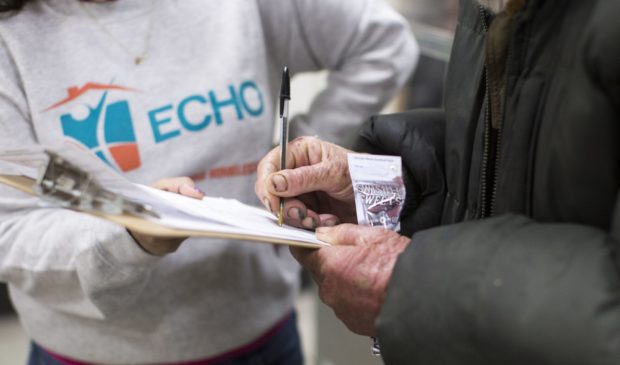Newsletter Signup
The Austin Monitor thanks its sponsors. Become one.
Most Popular Stories
- Cap Metro to shelve 46 new electric buses for a year after manufacturer bankruptcy
- Texas Attorney General Ken Paxton sues nonprofit that serves homeless in South Austin
- Mobility Committee hears public concern regarding expansion of MoPac
- City-owned Austin Studios found to have generated $2.6B in economic impact
- Red River music proponents see city funding as sign of support, progress
-
Discover News By District

Photo by Gabriel C. Pérez/KUT
New collaborative hopes to address equity gaps in Austin’s response to homelessness
Tuesday, November 23, 2021 by Andrew Weber, KUT
Austin has consistently struggled to get people living outdoors into homes. Part of that failure lies in the city’s unprecedented real estate boom and affordability crisis over the last 10 years. Another reason is that people of color, who are overrepresented among Austin’s homeless population, haven’t been able to connect with housing and case management as easily as white Austinites.
A new project hopes to change that.
The St. David’s Foundation is giving the Ending Community Homelessness Coalition, or ECHO, a $2 million grant to focus on getting marginalized Austinites – Black, Latino and LGBTQ people – services.
The project, called the Austin Street Outreach Collaborative, aims to hire 12 people over the two-year grant to connect these individuals with grassroots organizations already doing the work in marginalized communities.
Alesandra Dominguez, the associate director of ECHO’s crisis response system, said this program could be crucial, as those smaller, more flexible nonprofits have on-the-ground experience, but don’t get as much federal or local grant money as larger groups.
“This type of funding will really allow us to make a shift toward a more equitable system,” she said. “A lot of those more grassroots outreach providers don’t have the services to be able to … (support) more people.”
The effort was spurred in part by ECHO’s retooling of a program that determines who needs services the most. Dominguez found the system connected white people with housing more often than Black people.
She said the collaborative also hopes to address geographic equity by expanding service beyond the downtown area. She said the outreach team will go directly to people experiencing homelessness, rather than rely on folks to come to a certain provider.
“It allows us to really reach … more marginalized clients that maybe don’t feel as comfortable accessing our (services) at our more traditional access points, which are typically, unfortunately, in downtown areas,” she said.
Dominguez said the program aims to begin hiring and get off the ground early next year.
This story was produced as part of the Austin Monitor’s reporting partnership with KUT.
The Austin Monitor’s work is made possible by donations from the community. Though our reporting covers donors from time to time, we are careful to keep business and editorial efforts separate while maintaining transparency. A complete list of donors is available here, and our code of ethics is explained here.
You're a community leader
And we’re honored you look to us for serious, in-depth news. You know a strong community needs local and dedicated watchdog reporting. We’re here for you and that won’t change. Now will you take the powerful next step and support our nonprofit news organization?









